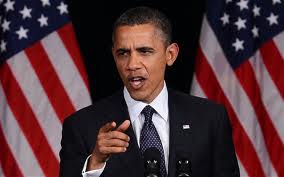 Barack Obama proposed a fresh blueprint for “reigniting” America’s economy and its middle class, calling for a sharp increase in the minimum wage for the first time in his presidency and a new drive to fix ailing infrastructure. Mr Obama also announced in his State of the Union address that the US and the EU would launch negotiations for a bilateral transatlantic trade deal, a long awaited decision which restores trade to the centre of efforts to spur growth in large industrial economies. [Financial Times]
Barack Obama proposed a fresh blueprint for “reigniting” America’s economy and its middle class, calling for a sharp increase in the minimum wage for the first time in his presidency and a new drive to fix ailing infrastructure. Mr Obama also announced in his State of the Union address that the US and the EU would launch negotiations for a bilateral transatlantic trade deal, a long awaited decision which restores trade to the centre of efforts to spur growth in large industrial economies. [Financial Times]
Britons were warned to brace themselves for a new rise in inflation this summer as rising energy prices and costlier imports impose a fresh clampdown on family budgets. The Bank of England is expected to predict today that inflation will remain above its target until halfway through the decade, while yesterday City economists forecast a near-term jump in inflation to 3 per cent or more over the coming months. The toll taken by the rising cost of living will be highlighted by research this morning showing that the ten million people on low to middle incomes face another decade before their living standards get back to where they were before the financial crisis. The Resolution Foundation’s study shows that it may be 2023 before typical earnings for such families return to £22,000 a year, equivalent to where they stood in 2008. [The Times]
More than 1,500 jobs are at risk as fashion chain Republic is expected to become the latest in a post-Christmas rush of retailers to collapse into administration. The Leeds-based company, which has 121 stores and employs 1,600 people, is expected to appoint Ernst & Young as its administrator on Wednesday. If it collapses, Republic will be the latest in a long list of retail failures since Christmas, including Jessops, HMV and Blockbuster, with the total loss of up to 10,000 jobs. [The Guardian]
A touch of glamour left the world’s largest industrial conglomerate last night as General Electric finally severed its ties with the actors, musicians and news anchors of NBC Universal in a deal worth $18.1 billion. GE said that it had sold its remaining 49 per cent stake in NBC Universal to Comcast, the cable operator that acquired a controlling stake in the media company two years ago. The sale is part of GE’s post-financial crisis strategy to return its focus to industrial activities, such as aircraft engines, train locomotives and power systems. In addition to selling NBC Universal, which includes the NBC television channel and Universal movie studio, GE is also reducing the scale of its financing division GE Capital. [The Times]
The Government will borrow about £75bn more next year than it had originally planned as growth continues to falter, according to figures from the CBI. In its latest economic forecast, the employers group warned that borrowing in 2014 would reach £112.5bn – £10bn more than in its November outlook. By comparison, the Treasury predicted in November 2010 that borrowing would have fallen to just £35bn in the year to March 2015. Taken together, borrowing for 2012, 2013 and 2014 will be £21bn more than the CBI predicted just three months ago. The increase was largely due to weaker growth than forecast last November. [The Telegraph]
The American fund manager T Rowe Price is the latest Dell shareholder to oppose plans to take the company private, saying the $13.65 per share offered by co-founder Michael Dell and the private equity group Silver Lake Partners is not high enough. T Rowe Price owns 4.4 per cent of Dell’s shares. Michael Dell owns about 16 per cent of the business. [The Independent]







